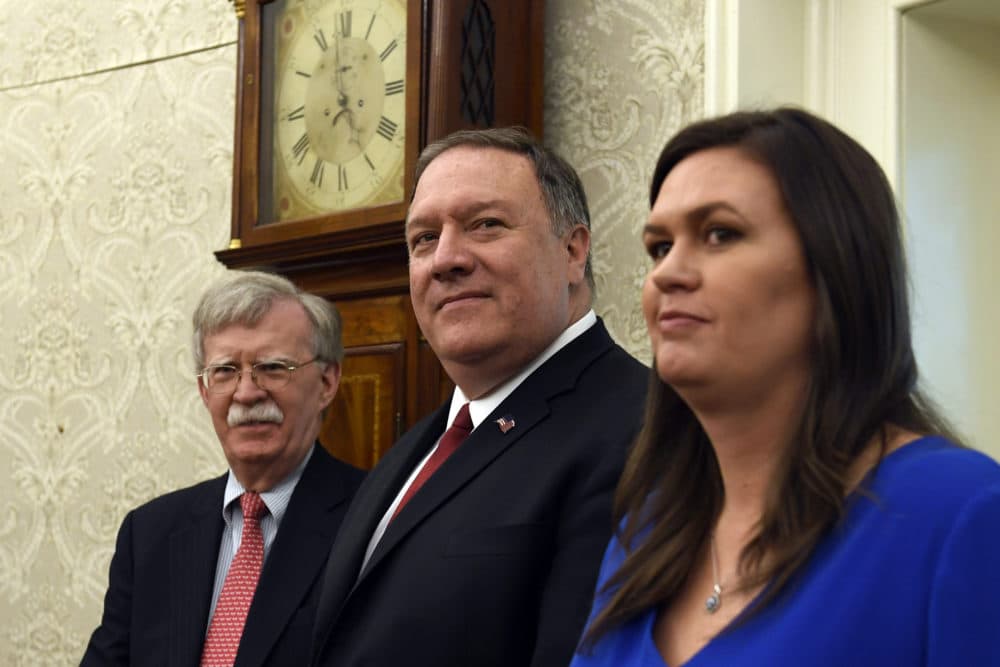Advertisement
What We Know (And Don't Know) About The State Of U.S.-Iran Relations

What exactly is going on between the U.S. and Iran right now?
U.S. personnel are being pulled from the embassy in Baghdad because of unspecified threats. Saudi oil tankers have been sabotaged — but by whom? The White House says it wants no war, but it has been ratcheting up tensions — and National Security Adviser John Bolton has repeatedly promised regime change in Iran by 2019.
"The behavior and the objectives of the regime are not going to change, and therefore the only solution is to change the regime itself," Bolton said back in 2017, speaking to a convention of the Iranian dissident, cult-like group, Mujahedin-e-Khalq.
On the other hand, Iran has given Europeans 60 days to figure out how to work around U.S. sanctions, or else Tehran will start abandoning some of its nuclear deal commitments. And U.S. allies are directly contradicting Washington reports of serious threats from the Iran-backed elements of the Popular Mobilization Forces (PMF).
"We've seen no change in the posture or the lay-down of the PMF," British Army Major General Chris Ghika said.
With all of these competing forces and reports tugging at both countries, where does that leave things?
To start, "everything we know about the threats has been through unnamed officials," Wall Street Journal national security correspondent Nancy Youssef told On Point. "Nobody has specified on the record, from the Pentagon or from the White House, what precisely the threats are."
Youssef underscores that longterm U.S. calculus and strategy in dealing with Iran, therefore, is still at least partly unclear. Watchers speculate that Iran could be reacting to increased U.S. sanctions and the designation of its paramilitary Islamic Revolutionary Guard Corps (IRGC) as a terrorist organization.
With Bolton leading national security, the question lingers: Is this back-and-forth escalation all heading toward conflict aimed at Iranian regime change?
"I don't know," Reuel Marc Gerecht, senior fellow with the Foundation for Defense of Democracies, said. "I think the administration has decided that taking an incremental approach with the Islamic Republic hasn't been successful. So they intend to use maximum economic pressure and they are taking precautions, certainly, that to let the regime know that they're willing to use military force if the Islamic Republic does certain actions."
Advertisement
Stephen Walt, professor of international affairs at Harvard’s Kennedy School of Government, echoes the uncertainty surrounding U.S. intentions and endgoals. But he notes the potential for miscalculation is "always a possibility" with the military forces in close proximity.
"I don't know what the Trump administration, actually, is trying to accomplish here — whether this is sort of just largely symbolic or whether this is an attempt to put pressure on Iran so that they'll negotiate some kind of new nuclear deal, something the president has talked about occasionally," Walt said. "And then there's the question that maybe we're putting all this pressure on Iran because we really do want regime change, something John Bolton and others have pushed for. I think that's very unlikely to happen."
Gerecht says the differences of opinion among security and state department leaders suggest that, for now, the use of sanctions might be the only area of consensus when it comes to U.S. action.
"We certainly use sanctions more intelligently and aggressively than we have in the past," he said. "But I don't see any other plans on the table. I'm skeptical that this is a stepping stone to military confrontation."
Walt believes that avoiding such intervention might be the best route, given the U.S.'s track record.
"I would just add that, you know, we ought to remember that starting wars in the Middle East has not been working out particularly well for the United States in recent years," he said. "And I hope the president still remembers that."
Stefano Kotsonis produced this hour for broadcast.

